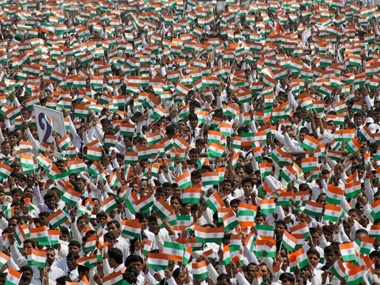The Supreme Court’s verdict directing cinema halls across the nation to play the National Anthem before a movie screening has garnered mixed reactions. While many applauded the apex court’s move, apparently aimed at rooting patriotism in the citizens, it also raised many eyebrows.
The Supreme Court order said: “People must feel this is my country and this is my motherland…At the root of protocol for national anthem, is respect for national identity, integrity and constitutional patriotism.” [caption id=“attachment_1038713” align=“alignleft” width=“380”] Representational image. Reuters[/caption] Some would argue that legal intervention in promoting and inserting national pride amid people can be a problematic idea. The notion that the National Anthem, played before a movie screening, can instill some sense of national pride remains debatable at best. We will not concern ourselves with the rights and wrongs of it. With all due respect to the apex court, the verdict as it stands now does direct the cinema halls to play the 52 second long National Anthem. Though it does seem interesting to probe how did the idea generate and the notion that the National Anthem – a subject of reverence – is somehow related to cinema — a media that was and is directed at entertainment and recreation. As this article in
The Guardian points out the practice to play National Anthem in cinema halls in India was first introduced after the 1962 India-China war. Those were the times of high national fervour, with India facing a mightier enemy at its borders. But then the National Anthem was played at the end of the movies. The moviegoers, ignorant to the diktat, would simply file out of the cinema hall soon after ‘The End’ flashed on the screens, and perhaps this was why the practice slowly faded and was eventually discontinued, until 2003. In 2003, as reported in The Huffington Post, “Narendra Verma of the Nationalist Congress Party lobbied and got the Maharashtra government to order cinema halls to do it again.” There have also been incidents, in the select few states where it is a law, of people heckling others for refusing to stand up during the National Anthem. The most recent, and shameful incident in this context was from Panaji in Goa, when Salil Chaturvedi, a disabled man was struck and abused for not standing up during the National Anthem, as he recounted his experience to Firstpost Hindi. As Salil points out, the crowd, agitated with national fervour often can blind people to the most obvious, and even human values – as in this case that a wheelchair-bound man could not have possibly stood up in attention. Incidentally, the law, does not as yet criminalise the act of not standing up while the National Anthem is playing.
The Ministry of Home Affairs advisory, to this day, states that a person shall stand up whenever the Anthem is sung or played, while conceding that it is not possible to list out all possible occasions when the National Anthem should be played. The Home Ministry advisory in the final clause, leaves it to the discretion and “good sense of the citizens not to indulge in indiscriminate singing or playing of the Anthem.”
It is interesting to probe, wherefrom did the idea crawl into our minds that the National Anthem – a subject of reverence – is somehow related to cinema.
Advertisement
End of Article


)

)
)
)
)
)
)
)
)



